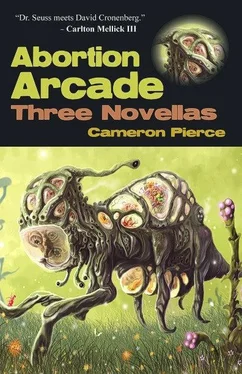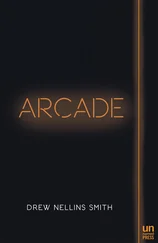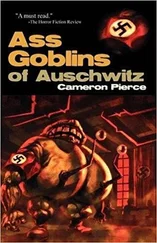When the hospital called with the date and time of the funeral, they also gave him directions and an address. He takes the piece of paper he’d written these things on out of his pocket. He looks it over. Although the hospital is only three miles away, Simon has never visited the city sector where it is located.
He gets on his bike. He pedals down the street, right hand on the handlebars and then no hands. This is the first time he has left the apartment since Celia’s death. He realizes how hard this is going to be.
He failed to consider how seeing strings might affect his getting around. Biking one-armed isn’t even the hard part. There are so many things alive in the world, so many strings crossing other strings. He feels as if he is riding into a citywide spider web. The blue strings of people, birds, sloths, elephants, badgers, and other city dwellers thread the streets and sky, connecting the invisible dots of the psychogeographic landscape that maps every impulse, routine, pressure, and pleasure of the city’s circuitry.
An eagle swoops down. It is tiger-eyed, its talons outstretched. A tiny elephant stumbles into Simon’s path. The eagle’s strings coil around the elephant’s strings as the eagle swoops down. Unable to swerve out of the way, Simon crashes his bike out of fear that his strings will crisscross those of the predator and its prey.
He sits up, strawberry patches for elbows and knees, as the eagle lifts the elephant toward the sun.
He must hurry to the funeral. He is no longer due to arrive early. He picks up his bicycle and wheels it along beside him.
He steps in a gutter full of water and says, “Fucking hell.”He contemplates running into the street and pulling all his strings. Why wait to die. He figures he’d better wait until after the funeral. Touching Celia’s coffin is the closest he’ll ever get to holding her again, unless there’s a Heaven and they both get to go there. Maybe they’ll reincarnate as slugs. They will rejoice, reliving the love and happiness of their human days, only slimier.
A caterpillar bus turns onto the street. Simon has always been afraid of caterpillar buses. He has never been good at riding with other people, let alone a few dozen strangers all at once.
The conductor of the caterpillar bus yells at the passengers to slow down. “Where you heading?” he calls to Simon.
“I’m going to the funeral home,” Simon says.
A few people shout for him to go away. The conductor tells them to knock it off. He turns to Simon. “That’s a steep climb. What are you willing to pay?”
Simon reaches into his pocket for his wallet. He removes a wad of bills from his wallet and hands the bills to the conductor, feeling glad that he always carries his money around despite the many times he has been called old-fashioned for doing so. Unfortunately, he is now totally broke. The conductor counts the money and nods.
“Climb aboard,” he says.
Climbing is not actually necessary to board the caterpillar bus. It is a huge metal caterpillar with bicycles instead of legs. The passengers pedal to operate a hydrogen engine located in the head. When the caterpillar bus moves fast enough, the hydrogen engine forms bubbles.
The bubbles float out of a brass smoking pipe welded between the caterpillar’s lips.
Simon secures his bike just behind the caterpillar’s head, upon which the conductor sits behind an enormous steering wheel. The conductor shouts for everyone to pedal. Simon and the rest of the passengers begin to pedal.
Since there are not many passengers, the caterpillar bus is very wobbly, like it is missing most of its legs.
As they pick up speed, bubbles float out of the caterpillar’s brass pipe, but the momentum quickly dies. There are not enough passengers to propel the caterpillar bus to go any faster. At this slow pace, Simon would almost be better off walking. Fortunately, the conductor does all the steering.
“We were moving along quite well before you came along,” a person behind him shouts.
“That funeral better be for someone important,” shouts another.
“It’s for my wife,” Simon shouts.
“He says it’s for his wife!”
“His wife? He’s riding a bicycle to his wife’s funeral?”
“What a disgrace!”
“An imbecile.”
“He’s a slow rider too.”
“Making us ride all the way up the damned mountain.”
“And filthy. Take a look at his clothes.”
“I’d looked forward to this ride.”
“The funeral boy has ruined it for us all.”
“A disgrace.”
The passengers of the caterpillar bus continue to berate him as they teeter out of the city and through a forest of plastic trees. They ascend a narrow mountain road so steep that Simon must hook his chin over his handlebars to prevent from falling backwards.
When the caterpillar bus halts to let him off, Simon realizes that all the other passengers have tumbled off their bikes. The caterpillar bus must contain reserves of hydrogen or some other fuel source. Simon thinks this is illegal but says nothing. He could never have propelled the bus up the mountain by himself.
“It’s not much further,” the conductor says.
Simon detaches his bike from the caterpillar bus and thanks the man. He continues on foot, thankful that the road has leveled off, as the caterpillar bus turns around and begins its slow crawl down the mountain.
A sign on the side of the road proclaims WELCOME TO JOHNSTON FUNERAL SERVICES. An empty parking lot overtaken by plastic blackberry bushes comes into view. Be yond the field of bushes, a glass dome sparkles in the hot afternoon sun. Skinny blue strings protrude from the glass walls. The strings sway in a light breeze. Simon follows them with his eyes, but the sunlight obscures their endpoints. For all he knows, they continue into outer space, and perhaps even further.
Simon locks his bike to a FUNERAL PARKING ONLY sign and approaches the glass dome.
A path cut in the blackberry bushes leads up to the dome. The path is overgrown. He is cut by plastic thorns.
Simon remembers when he and Celia went to New-port Beach and the same jellyfish stung them both. At the memory, his mouth creases into a smile, sadness filling him like sand. That was their first vacation together. The weather was miser able, the motel had cockroaches and moldy sheets, and they got stung by a jellyfish, yet they had the most beautiful time together.
He approaches the doorway cut into the glass dome.
The dome seems fancy for a funeral home. The strings rising through it belong to trees. Real trees.
Amidst the tree strings, there are smaller strings attached to the fruit that hang from branches. Simon has not seen a fruit tree in almost a full year. He doesn’t recognize the purplish fruit growing on the trees. He thinks they are plums.
He follows a cluster of larger strings down to the person they are attached to. She is a skeletal old woman swathed in vibrant greens, yellows, and reds. She is not frightening to look at, nor is she pretty.
“Excuse me,” he says, rapping lightly on the glass.
The old woman looks up. Her lips have been eaten away by something black. Simon casts his eyes to his shoes.
“I’m here for the funeral.”
The pressure behind his face swells. He closes his eyes, afraid his eyeballs will pop out. His knees buckle. He steps in side the glass dome and leans against the wall for support.
The old woman limps toward him. She stops to pick some fruit off of a tree. When she gets close enough, she hands him a piece of fruit.
“What is it?” says Simon.
“Pluot.”
“Thank you.”
“It’s good.”
Simon looks at the smooth-fleshed, purple fruit. It fits perfectly in his right palm. As he holds the fruit, the blue string coiled around the stem disintegrates.
Читать дальше












